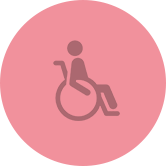Tips to make people with autism and (early stages of) dementia get used to summer time
For people with autism or (early stateges of) dementia, adjusting the clock can be enormously confusing. Autists, but also people with dementia have a lot of need for structure. Because they benefit from a fixed rhythm and this rhythm "suddenly" is changed, people with autism and dementia can also suffer from the conversion of winter- to summertime. When adjusting the clock, their biological clock is telling them something different than what the new day interpretation requires from them. They get the need to eat something at the usual time or want to get up or go to bed on the "old" time.
It is important to prepare people with dementia and autism to adjustment of the clock and help and guide them to getting used to the summertime. The feeling, the transfer is experienced as "slightly vague"and they feel something is off, is difficult to understand and especially what exactly causes it.
A few tips to make people with autism and (early stages of) dementia get used to summertime:
It is important to prepare people with dementia and autism to adjustment of the clock and help and guide them to getting used to the summertime. The feeling, the transfer is experienced as "slightly vague"and they feel something is off, is difficult to understand and especially what exactly causes it.
A few tips to make people with autism and (early stages of) dementia get used to summertime:
- First of all, it is very important that you are aware of the fact that people with a special needs can be affected by adjusting the clock. Sensory overload and hyperactivity or the opposite, being very tired or depressed, can be a result of this ‘switch’ in time.
- Let a person with autism or dementia slowly get used if this is an option. Start bedtime 10 – 15 minutes earlier in the evening and make them get up 10 – 15 minutes earlier the next morning. This way the transition is more gradual and will less effect them. Take a look at our white noise sound device with warm LED light!
- There are special products that slowly make 'natural' light increase in the room in the morning, instead of staring directly into the bright light of the lamp once opening your eyes. This can prevent depressive feelings.
- People with mental disabilities, autism, PDD-NOS, ADHD, Asperger's syndrome or (early stages of) dementia have little sense of time and trouble with reading clock which makes the adjustment of the clock more difficult for them to cope with. The Time Timer can be a useful tool to increase and stimulate sense of time. The Time Timer is a clock that visualizes time. You don’t have to be able to read a traditional clock to use a Time Timer. The red disk disappears as time passes, making the passage of time visible as well as time that is left.
- If possible, spend some extra time with your loved ones around meals. Those are often the times when the body indicates something else than the clock is showing.
- Have a more restful activity together to make the transition into the night run more smoothly. You can think of playing relaxing music or using stress-lowering scents.
- Close the curtains earlier so that one knows that the day is over and his or her body keeps the day and night rhythm. For example, you can use our Laser Stars Projector to create a magical starry sky.
- Open the curtains first thing in the morning, so daylight enters the room and immediately start an activity to make sure they are well awake.










 Back
Back